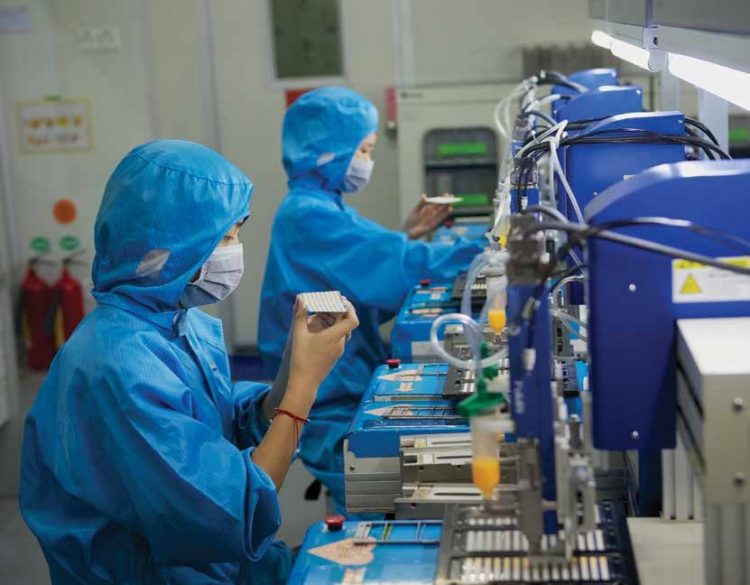By Dr Peter T Treadway
Professor, author and financial advisor, Dr Peter T Treadway is currently principal of Historical Analytics LLC, a consulting firm with an investment approach based on his Wall Street experience as economist, strategist and securities analyst.
In his maiden column for Inside Asian Gaming, Dr Peter T Treadway takes a closer look at technological advancements in China and the United States and explains why China still has some ground to make up.
China is on its way to joining the United States as the co-preeminent economic and technological power in the 21st century. But don’t get carried away – China’s not there yet.
Investors should take the positive view. This can be an opportunity. It’s a global economy – regardless of what Donald Trump, Hilary Clinton, the Brexiters and all the populist losers might like. And it will be a better world if technical knowledge spreads at internet speed from an ever-expanding number of global nodes. In the bad old days of the past, it took centuries for the Four Great Inventions mentioned above to spread from China.
China still has a long way to go in the technology area. Yes, social media and e-commerce companies like Alibaba are no longer just copies of American models but have morphed into major innovators in their Chinese market. And the Chinese space program is impressive as is China’s genomics research. But in such important areas as chips, software, the cloud or building large commercial airplanes, China has a long way to go to catch up to the United States and the Western world in general.
The biggest barriers to China’s technology ascent in my opinion are China’s protectionist policies, its restraints on the flow of knowledge and its Confucian tradition of conformity.
Clearing away the nonsense
Allow me to start by dismissing three myths about China. The first is that the current Chinese regime is about to collapse or suddenly become more democratic. Sorry. Chinese dynasties last a long time. The prior Qing Dynasty lasted from 1644-1911. Before that, there was the Ming Dynasty from 1368-1644. The Communist “Dynasty” has only been around since 1949 – a relative youngster by Chinese standards. Not only that, from about 1850 right through the Cultural Revolution which ended in 1976, the Chinese people have gone through a never-ending hell of disruptions, civil breakdowns, civil wars and foreign invasions. The Chinese people today want a peaceful life. So long as the government leaves them alone, they are happy. Democracy is a foreign concept. Looking back over the thousands of years of imperial Chinese history of which most Chinese are proud, there’s never been anything like a bill of rights or an election.
The second myth is that Hong Kong can become independent or somehow deviate from its Basic Law constitution negotiated by the British. Beijing will never allow it. Hong Kong should concentrate on exploiting its many advantages. One thing it could do is intensify its efforts to become the center of finance for Chinese tech companies (sending Alibaba to do its IPO in New York was a colossal blunder).
The young activists who are agitating for independence and/or significant change are wasting their time and hurting Hong Kong. The Western media, including the Wall Street Journal and CNN who lionize these activists, are doing Hong Kong a great disservice by encouraging what amounts to a latter-day Children’s Crusade. I can remember being in Hong Kong two years ago when the activist-led Occupy movement was disrupting Hong Kong. The activists hoped visiting Mainland tourists would join them and then go back to China and agitate for change. But they didn’t. Instead, the Mainlanders were annoyed that the Occupy street disruptions were making it difficult to get to their favorite Louis Vuitton and Chanel stores. Hong Kong’s business is business.
The third item of nonsense is that China has suddenly leapt ahead of the United States in Artificial Intelligence (AI). “China overtakes the US in Artificial Intelligence Research” was the headline in a recent edition of the South China Morning Post and several US newspapers including The Washington Post. All this is supposedly based on a report put out by the previous Obama Administration showing that the Chinese are now writing more papers on the subject.
I see this as a Chinese-are-getting-ahead-of-us scare drummed up by the Obama Administration to justify more federal spending and intervention in AI (this scare tactic used to work with the Japanese and before them the Soviets.) The fact is that Alphabet, Amazon, Facebook, Microsoft, IBM and Apple are the world leaders in applying AI.
Intel and NVIDIA among many other American companies make or design the chips and they, not the Chinese companies, are on the cutting edge. No chips, no AI. These companies don’t need federal money. Most have more cash than they know what to do with. Baidu, China’s leading contender in this area, has opened a major AI research facility in Silicon Valley, run by none other than a former Stanford professor. The top Chinese graduate students in AI head for US, not Chinese, universities.

Some certainties
The first certainty is that, however badly the PRC government allocates resources and however suboptimal the economic structure, the hardworking, obsessed with technology and greedy (greed is good!) 1.3 billion Chinese people are the country’s major asset and make it a country investors cannot ignore. To put it another way, with a populace like this the government unfortunately has the latitude to screw up a great deal.
The second certainty is that China is and will likely remain highly protectionist. Mercantilist protectionist policies have been an integral part of East Asian countries’ development strategies including Japan, Korea and Taiwan. With my classical economics background, I’m biased against protectionist strategies. True, in China’s case the damage is mitigated somewhat. China’s 1.3 billion population makes for a significant market. Protectionism in the case of a small country like Singapore would be fatal.
Related to China’s protectionist policies is the Communist Party’s (CPC) obsessive need to control the flow of information. Otherwise, global American social media companies can forget China. No Google or Facebook will be allowed. Netflix is the latest to give up. Actually, the CPC’s obsession builds nicely on a 2000-year-old Chinese tradition of Confucian obedience combined with intellectual excellence. Over the Imperial millennia, the ideal Chinese state was supposed to be run by legions of obedient Confucian scholars with the Emperor at the head. Beginning way back in the Han Dynasty (206BC-220 AD), the road to success in China was to do well in the Imperial examinations, which was how you got a cushy government job. These examinations were very competitive – only the best and the brightest succeeded. They continued to be given with only minor interruptions until 1905.
The examinations emphasized memorization of Confucian texts, themselves exemplars of obedience and harmony. Creativity was not valued. I doubt Steve Jobs would have passed. Chairman Mao tried to stamp out Confucian thinking but it was too deeply embedded even for the Great Helmsman and it has been reembraced by the current regime.
Should investors care about this? For low tech investments it probably doesn’t matter. China is the world’s number one factory regardless of intellectual restraints by the CPC and a Confucian cultural DNA (or maybe because of the discipline of a Confucian DNA). But for the new high tech knowledge industries, intellectual freedom matters. As the cliché says, knowledge yearns to be free. Of course, this is an unproven hypothesis. Not everyone agrees. As one wag put it, “does it matter if a young person writing code doesn’t know anything about Tiananmen Square?” If it does matter and China remains protectionist, China will not reach its full tech and investment potential.

One guideline to investing in Chinese tech stocks
This is not an exclusionary guideline. There are certainly other ways to pick Chinese stocks. And as in the US, the hot startups are out of reach for most investors. Taking a longer-term view, I would look for Chinese tech stocks with the following characteristics: First they should be traded on US, British or Hong Kong exchanges. For foreign investors, Anglo Saxon law and reports in the English language are important. And trading out of China proper, they are far less subject to Chinese government manipulation.
Second, their business models should be the disrupting of some aspect of the Chinese market. Global ambitions are out of reach for now. Forecasts of global domination made by such luminaries as Alibaba CEO Jack Ma should be greeted with skepticism. The global American social media companies like Facebook can’t get into China and their Chinese equivalents can’t get out. For example, Tencent’s WeChat is everywhere in China but, despite the company devoting resources to marketing WeChat globally, it is nowhere outside of China. Whether it’s the difficult Chinese language, Chinese and non-Chinese protectionism or residual Confucianism which limits Chinese thinking outside its “China box”, it is hard to say.
Third, these companies should, like the top US companies, be focused on AI, deep learning and the cloud. The acceleration of technology is a global phenomenon. The market may be different but Baidu’s technology operating a driverless car will not likely be that different from the technology operating a driverless car in the US. All these companies are fishing in – and hopefully adding to – the same pond of global knowledge.
The “Big Three” China tech stocks, the so-called BATs – Baidu, Alibaba and Tencent – fulfill the above conditions. Like their US counterparts, they’ve got the brains and the cash. They are also de facto oligopolies in many of the sectors they operate. That may be a short-term positive for investors. But I would argue in the long run this is a negative, since they are also operating in a protected and information controlled world. My Chinese friends always tell me that Google search is better than Baidu’s – an unscientific survey, but I’m not surprised.
The American and Chinese tech companies all draw from the same global talent pool. Silicon Valley is filled with Chinese scientists and executives who were educated in the US. And many of these – like Baidu’s Robin Li – go back to China, speak English, have a rolodex of US colleagues and hopefully remember their US stay fondly. This is not a zero-sum game. The US, China and global investors all benefit. Populist urges to inhibit the flow of talent and ideas between the US and China benefit no one.
Note my comments are long run considerations. I believe technology is the place to be investment-wise but, at least in this particular piece, I am not taking shorter run valuation questions into account or the China slowdown.
































